雅思写作Task2范文:去国外留学的利弊
国外留学的利与弊英语作文
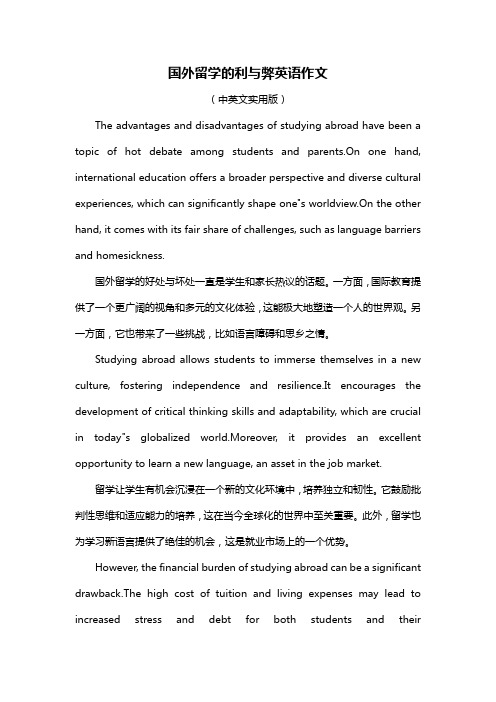
国外留学的利与弊英语作文(中英文实用版)The advantages and disadvantages of studying abroad have been a topic of hot debate among students and parents.On one hand, international education offers a broader perspective and diverse cultural experiences, which can significantly shape one"s worldview.On the other hand, it comes with its fair share of challenges, such as language barriers and homesickness.国外留学的好处与坏处一直是学生和家长热议的话题。
一方面,国际教育提供了一个更广阔的视角和多元的文化体验,这能极大地塑造一个人的世界观。
另一方面,它也带来了一些挑战,比如语言障碍和思乡之情。
Studying abroad allows students to immerse themselves in a new culture, fostering independence and resilience.It encourages the development of critical thinking skills and adaptability, which are crucial in today"s globalized world.Moreover, it provides an excellent opportunity to learn a new language, an asset in the job market.留学让学生有机会沉浸在一个新的文化环境中,培养独立和韧性。
评价出国留学的利弊英语作文

评价出国留学的利弊英语作文The Pros and Cons of Studying Abroad.Studying abroad presents a unique opportunity for individuals to expand their horizons, gain cross-cultural understanding, and pursue academic and personal growth. However, this experience is not without its challenges and drawbacks. In this essay, I will explore the benefits and costs of studying abroad, discussing both the positive and negative aspects of this international educational endeavor.Benefits of Studying Abroad.1. Cultural Immersion: Studying abroad offers an unparalleled opportunity to immerse oneself in a new culture. Living and learning in a foreign country exposes students to different values, traditions, and ways of life. This cultural immersion enhances their understanding of the world and cultivates a more global perspective.2. Language Acquisition: For many students, studying abroad is the best way to learn a new language. Immersionin a foreign language environment accelerates language acquisition and improves fluency. This skill is invaluable in today's interconnected world, where proficiency in multiple languages can open doors to career opportunities and cultural exchanges.3. Personal Development: Studying abroad promotes personal growth and development. Living independently in a foreign country requires students to adapt to new environments, solve problems, and make decisions. These experiences foster resilience, self-confidence, and interpersonal skills.4. Expanded Academic Options: Studying abroad often provides access to a broader range of academic programs and courses than may be available domestically. Students can explore fields of study that are unique or more advanced than those offered at their home institutions.5. Professional Networking: Studying abroad offersstudents the chance to build professional networks with peers and mentors from around the globe. These networks can be invaluable in future career development, providing access to job opportunities, internships, and mentorship programs.Costs of Studying Abroad.1. Financial Burden: Studying abroad can be a significant financial investment. Tuition fees, living expenses, and travel costs can be prohibitively expensive for many students and families. While scholarships and grants may offset some of these expenses, the financial burden can still be substantial.2. Cultural Clash: While cultural immersion is a significant benefit of studying abroad, it can also lead to cultural clash. Differences in values, norms, and expectations can be jarring for students who are not accustomed to them. Navigating these differences can be challenging and emotionally draining.3. Isolation and Homesickness: Studying abroad often requires students to leave their families and friends behind. This can lead to feelings of isolation and homesickness, particularly during the initial adjustment period. Students must learn to cope with these emotions and find ways to connect with their new environment.4. Language Barrier: While studying abroad is an excellent opportunity to learn a new language, the language barrier can be a significant challenge. Communication difficulties can affect academic performance, social integration, and day-to-day life. Students must be willing to put in the effort to overcome this barrier through practice and language courses.5. Uncertainty and Risk: Studying abroad involves a degree of uncertainty and risk. Political instability, natural disasters, and other unexpected events can disrupt study plans and affect student safety. While most institutions strive to mitigate these risks, students must be prepared to navigate unexpected challenges and make informed decisions about their safety and well-being.In conclusion, studying abroad offers numerous benefits that can transform students' academic and personal lives. However, it is not without its costs and challenges. Students considering this option must carefully weigh the pros and cons, considering their financial situation, personal goals, and readiness to embrace the unique challenges and opportunities of studying abroad.。
出国留学的好处和坏处英语作文

出国留学的好处和坏处英语作文Studying abroad is often considered a life-changing experience that offers numerous benefits, as well as some challenges. Here is an essay that explores the advantages and disadvantages of pursuing higher education in a foreign country.Advantages of Studying Abroad1. Cultural Exposure: One of the most significant benefits is the exposure to a new culture. Students can immerse themselves in the local customs, traditions, and lifestyle, which can be an enriching experience.2. Language Skills: For students studying in a country wherea different language is spoken, the opportunity to become fluent or improve their language skills is invaluable.3. Global Network: Studying abroad allows students to build a network that spans across the globe, which can be beneficial for future career opportunities.4. Educational Opportunities: Some countries offer specialized programs or research opportunities that may not be available in their home country.5. Personal Growth: Living independently in a foreign land can foster personal development, including increased self-confidence, adaptability, and problem-solving skills.Disadvantages of Studying Abroad1. Financial Burden: The cost of studying abroad can be substantial, including tuition fees, accommodation, travel expenses, and the general cost of living.2. Homesickness: Being away from family and friends can leadto feelings of loneliness and homesickness, which can be challenging to manage.3. Cultural Shock: Adjusting to a new culture can bedifficult and may lead to culture shock, which can affect a student's mental health and academic performance.4. Language Barrier: Even with language skills, misunderstandings can occur due to cultural nuances or accents, which can be frustrating.5. Career Uncertainty: Some students may find it challengingto integrate their international qualifications with job markets back home or to find employment in their field of study.In conclusion, studying abroad is a decision that requires careful consideration of both the benefits and the challenges. It can be a transformative experience that opens up new horizons and opportunities, but it also comes with its ownset of difficulties that students must be prepared to face.。
出国留学的好处和缺点英语作文

出国留学的好处和缺点英语作文Benefits and drawbacks of studying abroad.Studying abroad is a life-changing experience that can provide students with a wealth of benefits. However, it is important to also be aware of the potential drawbacks before making a decision.Benefits.There are many benefits to studying abroad, including:1. Personal growth: Studying abroad can help students to develop a greater sense of independence and self-reliance. They will be forced to step outside of their comfort zone and learn how to navigate a new culture and language. This experience can be incredibly empowering and can help students to grow as individuals.2. Academic enrichment: Studying abroad can providestudents with the opportunity to learn about different academic subjects in a new and exciting way. They will be exposed to new perspectives and ideas, and they will have the opportunity to learn from world-renowned experts in their field.3. Career advancement: Studying abroad can give students a competitive edge in the job market. Employers value employees who have international experience and who are able to think critically and solve problems in a global context.4. Cultural immersion: Studying abroad allows students to experience a new culture firsthand. They will learn about the local customs and traditions, and they will have the opportunity to make friends from all over the world. This experience can be incredibly enriching and can help students to develop a greater understanding of the world.Drawbacks.While there are many benefits to studying abroad,there are also some potential drawbacks to consider:1. Cost: Studying abroad can be expensive. Studentswill need to pay for tuition, housing, food, and transportation. They may also need to pay for a visa and health insurance.2. Homesickness: Studying abroad can be a lonely experience. Students may miss their family and friends, and they may feel overwhelmed by the challenges of living in a new country.3. Culture shock: Culture shock is a common experience for students who study abroad. They may find that the local customs and traditions are very different from their own, and they may have difficulty adjusting to the new environment.4. Language barriers: Students who study abroad in a country where they do not speak the local language may have difficulty communicating with their classmates and professors. This can make it difficult to succeedacademically and to make friends.Overall, studying abroad can be a rewarding and life-changing experience. However, it is important to weigh the benefits and drawbacks carefully before making a decision.中文回答:出国留学的利与弊。
海外留学的优点和缺点英语作文
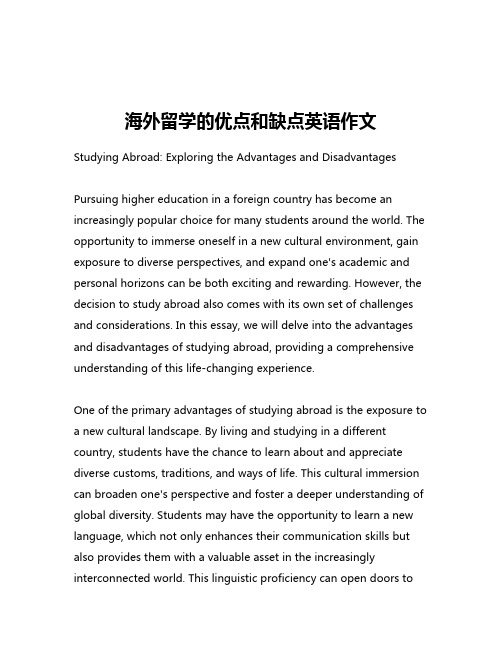
海外留学的优点和缺点英语作文Studying Abroad: Exploring the Advantages and DisadvantagesPursuing higher education in a foreign country has become an increasingly popular choice for many students around the world. The opportunity to immerse oneself in a new cultural environment, gain exposure to diverse perspectives, and expand one's academic and personal horizons can be both exciting and rewarding. However, the decision to study abroad also comes with its own set of challenges and considerations. In this essay, we will delve into the advantages and disadvantages of studying abroad, providing a comprehensive understanding of this life-changing experience.One of the primary advantages of studying abroad is the exposure to a new cultural landscape. By living and studying in a different country, students have the chance to learn about and appreciate diverse customs, traditions, and ways of life. This cultural immersion can broaden one's perspective and foster a deeper understanding of global diversity. Students may have the opportunity to learn a new language, which not only enhances their communication skills but also provides them with a valuable asset in the increasingly interconnected world. This linguistic proficiency can open doors tofuture career opportunities and personal growth.Furthermore, studying abroad often presents students with the chance to gain a more independent and self-reliant mindset. Living away from the comfort of their home environment requires students to navigate unfamiliar surroundings, manage their own finances, and make decisions independently. This level of autonomy can contribute to the development of essential life skills, such as problem-solving, adaptability, and resilience. These qualities are highly valued by employers and can give students a competitive edge in the job market upon their return.Another significant advantage of studying abroad is the opportunity to expand one's academic and professional horizons. By studying in a foreign institution, students may have access to specialized programs, cutting-edge research facilities, or unique learning opportunities that may not be available in their home countries. This exposure to diverse educational systems and approaches can broaden their academic perspectives and provide them with a more well-rounded education. Additionally, studying abroad can facilitate the establishment of international networks and collaborations, which can be beneficial for future career prospects and research endeavors.However, it is important to acknowledge the potential challengesand disadvantages associated with studying abroad. One of the primary concerns is the financial burden. Studying in a foreign country often comes with higher tuition fees, living expenses, and travel costs, which can be a significant financial strain on students and their families. This financial commitment can be a deterrent for some students, particularly those from underprivileged backgrounds, and may limit the accessibility of overseas education.Another potential disadvantage is the sense of homesickness and cultural shock that students may experience. Adapting to a new environment, language, and social norms can be a daunting and stressful process, especially for those who are far from their support systems. This adjustment period can take a toll on a student's mental health and well-being, potentially affecting their academic performance and overall quality of life.Additionally, studying abroad may present challenges in terms of credit transfer and academic recognition. Navigating the differences in educational systems, grading scales, and degree structures can be complex and may result in difficulties in transferring credits or having one's qualifications recognized upon return to their home country. This can create additional hurdles for students and may prolong the duration of their studies.Furthermore, the experience of studying abroad can lead to thedevelopment of a strong attachment to the host country, which may make it challenging for students to return to their home countries after graduation. This can result in a brain drain, where talented individuals choose to remain in the host country rather than contributing to the development of their home countries.In conclusion, studying abroad is a multifaceted experience that offers both advantages and disadvantages. While the cultural immersion, academic enrichment, and personal growth opportunities can be invaluable, the financial burden, homesickness, and academic recognition challenges must also be carefully considered. Ultimately, the decision to study abroad should be based on a thorough evaluation of one's personal goals, financial resources, and willingness to embrace the unique challenges and rewards of this life-changing experience. By weighing the pros and cons, students can make an informed decision that aligns with their educational and personal aspirations.。
雅思范文:出国留学的利弊(中英对照)
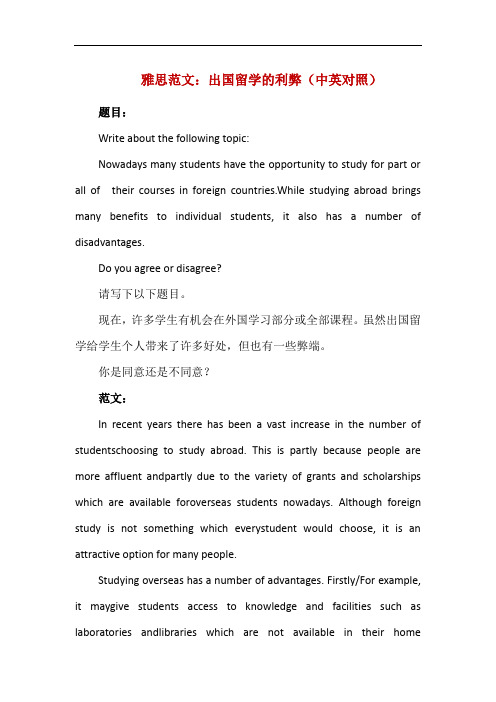
雅思范文:出国留学的利弊(中英对照)题目:Write about the following topic:Nowadays many students have the opportunity to study for part or all of their courses in foreign countries.While studying abroad brings many benefits to individual students, it also has a number of disadvantages.Do you agree or disagree?请写下以下题目。
现在,许多学生有机会在外国学习部分或全部课程。
虽然出国留学给学生个人带来了许多好处,但也有一些弊端。
你是同意还是不同意?范文:In recent years there has been a vast increase in the number of studentschoosing to study abroad. This is partly because people are more affluent andpartly due to the variety of grants and scholarships which are available foroverseas students nowadays. Although foreign study is not something which everystudent would choose, it is an attractive option for many people.Studying overseas has a number of advantages. Firstly/For example, it maygive students access to knowledge and facilities such as laboratories andlibraries which are not available in their homecountry.Furthermore/Moreover/What is more/Secondly, by looking abroad students may finda wider range of courses than those offered in their country’s universities, andtherefore one which fits more closely to their particular requirements.On the other hand, studying abroad has a number of drawbacks. These may bedivided into personal and professional. Firstly students have to leave theirfamily and friends for a long period. Furthermore/Moreover/What is more/Secondlystudying abroad is almost always more expensive that studying in one’s localuniversity. Finally/Furthermore/Moreover/What is more, students often have tostudy in a foreign language, which may limit their performance and mean they donot attain their true level.In my opinion/On the other hand, however, the disadvantages of studyingabroad are usually temporary in nature. Students who study abroad generallybecome proficient in the language quite soon and they are only away from theirfamily and friends for a year or two. Furthermore/What is more, many of thebenefits last students all their lives and make them highly desirable toprospective employers.译文:近年来,选择出国留学的学生人数大幅增加。
出国留学利弊英文作文
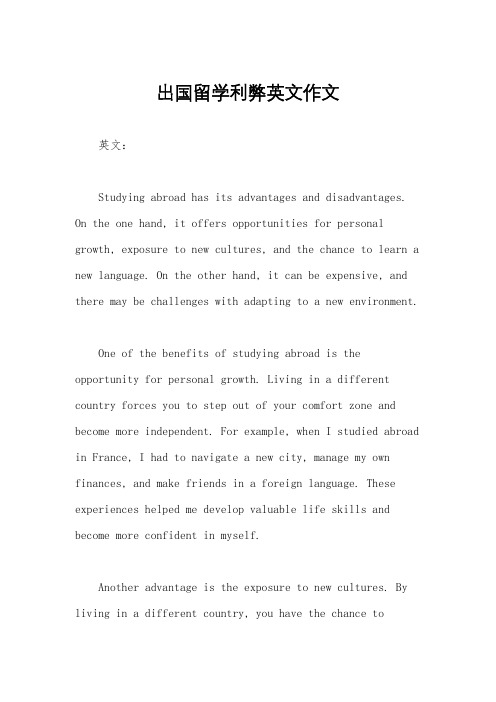
出国留学利弊英文作文英文:Studying abroad has its advantages and disadvantages. On the one hand, it offers opportunities for personal growth, exposure to new cultures, and the chance to learn a new language. On the other hand, it can be expensive, and there may be challenges with adapting to a new environment.One of the benefits of studying abroad is the opportunity for personal growth. Living in a different country forces you to step out of your comfort zone and become more independent. For example, when I studied abroad in France, I had to navigate a new city, manage my own finances, and make friends in a foreign language. These experiences helped me develop valuable life skills and become more confident in myself.Another advantage is the exposure to new cultures. By living in a different country, you have the chance toimmerse yourself in a new way of life and gain a deeper understanding of the world. For instance, during my time in Japan, I was able to participate in traditional tea ceremonies, visit ancient temples, and learn about the customs and traditions of the Japanese people. These experiences broadened my perspective and enriched my lifein ways that would not have been possible if I had stayedin my home country.However, studying abroad also has its drawbacks. One of the main disadvantages is the cost. Tuition, living expenses, and travel can add up to a significant financial burden. Additionally, there may be unexpected expenses, such as medical emergencies or visa issues, that canfurther strain your budget. When I studied in Australia, I had to carefully budget my money and make sacrifices in order to afford my living expenses. It was a challenging experience that taught me the value of financial responsibility.Another downside is the challenge of adapting to a new environment. Language barriers, cultural differences, andhomesickness can make the adjustment period difficult. For example, when I first arrived in Germany, I struggled to communicate with locals and felt isolated from my friends and family back home. It took time and effort to overcome these obstacles and feel at home in my new surroundings.In conclusion, studying abroad has both advantages and disadvantages. It offers opportunities for personal growth and cultural enrichment, but it can also be expensive and challenging. Despite the drawbacks, the experience of studying abroad is invaluable and has the potential to positively impact your life in countless ways.中文:出国留学有其利与弊。
外出留学的好处和坏处英语作文

外出留学的好处和坏处英语作文Studying abroad has both its advantages and disadvantages. On the one hand, it can broaden one's horizons and provide valuable international experience. On the other hand, it can be financially challenging and may also lead to feelings of homesickness.One of the main benefits of studying abroad is the opportunity to immerse oneself in a different culture and language. This can lead to personal growth and a better understanding of the world. Additionally, studying abroad often provides access to high-quality education and can enhance one's career prospects.However, there are also drawbacks to studying abroad. Financially, it can be a significant burden, as tuitionfees and living expenses can be quite high. Furthermore, being away from family and friends for an extended periodof time can lead to homesickness and feelings of isolation.Overall, studying abroad can be a rewarding experience, but it is important to carefully consider both the pros andcons before making the decision to pursue an education in a foreign country.留学的好处和坏处各有其优缺点。
出国留学好处和弊端英语作文
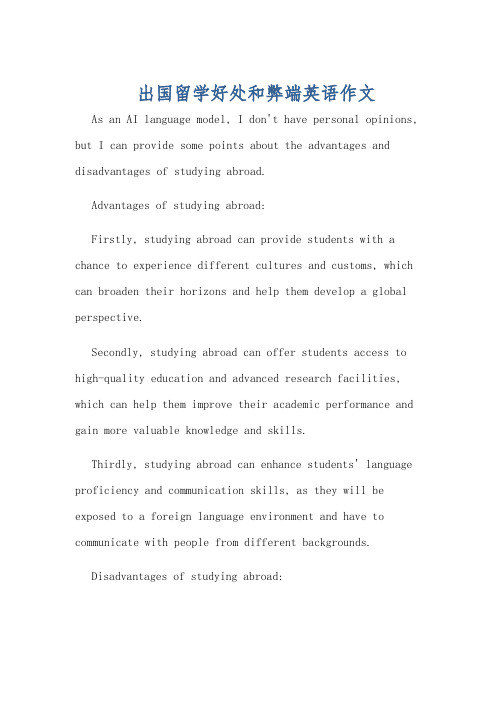
出国留学好处和弊端英语作文As an AI language model, I don't have personal opinions, but I can provide some points about the advantages and disadvantages of studying abroad.Advantages of studying abroad:Firstly, studying abroad can provide students with a chance to experience different cultures and customs, which can broaden their horizons and help them develop a global perspective.Secondly, studying abroad can offer students access to high-quality education and advanced research facilities, which can help them improve their academic performance and gain more valuable knowledge and skills.Thirdly, studying abroad can enhance students' language proficiency and communication skills, as they will be exposed to a foreign language environment and have to communicate with people from different backgrounds.Disadvantages of studying abroad:Firstly, studying abroad can be very expensive,including tuition fees, accommodation, food, transportation, and other expenses, which can put a heavy financial burden on students and their families.Secondly, studying abroad can be challenging, asstudents may face various difficulties and obstacles, such as cultural shock, language barriers, homesickness, and academic pressure, which can affect their mental health and well-being.Thirdly, studying abroad may also pose risks tostudents' safety and security, as they may encounterdifferent social and political situations, such as discrimination, racism, violence, and terrorism, which can endanger their personal safety and health.总之,出国留学有其利有其弊,需要学生根据自身情况和需求来做出决策,并做好充分的准备和规划,以克服各种挑战和迎接各种机遇。
出国留学的好处和坏处英语作文
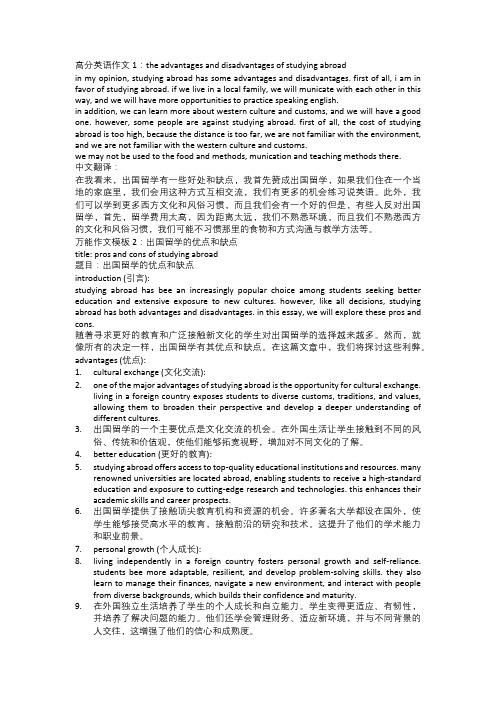
高分英语作文1:the advantages and disadvantages of studying abroadin my opinion, studying abroad has some advantages and disadvantages. first of all, i am in favor of studying abroad. if we live in a local family, we will municate with each other in this way, and we will have more opportunities to practice speaking english.in addition, we can learn more about western culture and customs, and we will have a good one. however, some people are against studying abroad. first of all, the cost of studying abroad is too high, because the distance is too far, we are not familiar with the environment, and we are not familiar with the western culture and customs.we may not be used to the food and methods, munication and teaching methods there.中文翻译:在我看来,出国留学有一些好处和缺点,我首先赞成出国留学,如果我们住在一个当地的家庭里,我们会用这种方式互相交流,我们有更多的机会练习说英语。
去海外留学的利弊英语作文

去海外留学的利弊英语作文Studying overseas can be an exciting and enriching experience, but it also has its challenges. Let's dive into the pros and cons of this adventure!First up, the benefits are huge. You'll get to immerse yourself in a new culture, which is an incredible way to broaden your horizons. Not only will you learn about different traditions and customs, but you'll also have the opportunity to make friends from all over the world. Plus, overseas education often offers a more international perspective, which can be really valuable in today's globalized world.But of course, there are some downsides too. Leaving your home and family can be tough, especially if you're not used to being away from them for long periods of time. There can be a lot of homesickness, and it can be hard to adjust to a new environment and lifestyle. Plus, studying overseas can be expensive, with tuition fees and livingcosts often much higher than at home.On the flip side, overseas study can be a great way to improve your。
去国外读书优劣英文作文

去国外读书优劣英文作文英文:As someone who has studied abroad, I can say that there are both advantages and disadvantages to pursuing an education in a foreign country.On the one hand, studying abroad allows you to immerse yourself in a new culture and gain a more global perspective. You have the opportunity to learn a new language, make international friends, and experiencedifferent customs and traditions. This can be incredibly enriching and broaden your horizons in ways that studyingat home simply cannot.On the other hand, studying abroad can also be challenging. You may struggle to adapt to a new environment, language, and academic system. You may feel homesick and miss your family and friends. Additionally, studying abroad can be expensive, and you may have to deal with issuesrelated to visas, housing, and healthcare.Despite these challenges, I believe that studyingabroad is ultimately worth it. The experiences and skills you gain from living and studying in a foreign country can be invaluable, both personally and professionally. For example, I studied abroad in Japan and was able to improve my Japanese language skills, gain a deeper understanding of Japanese culture, and make lifelong friends from all overthe world.中文:作为一名曾经出国留学的人,我可以说,去国外读书有优点也有缺点。
出国留学的利与弊英语作文
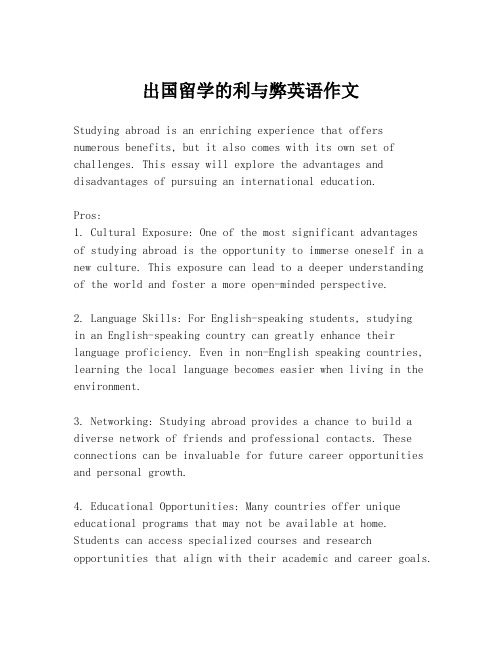
出国留学的利与弊英语作文Studying abroad is an enriching experience that offers numerous benefits, but it also comes with its own set of challenges. This essay will explore the advantages and disadvantages of pursuing an international education.Pros:1. Cultural Exposure: One of the most significant advantagesof studying abroad is the opportunity to immerse oneself in a new culture. This exposure can lead to a deeper understanding of the world and foster a more open-minded perspective.2. Language Skills: For English-speaking students, studyingin an English-speaking country can greatly enhance their language proficiency. Even in non-English speaking countries, learning the local language becomes easier when living in the environment.3. Networking: Studying abroad provides a chance to build a diverse network of friends and professional contacts. These connections can be invaluable for future career opportunities and personal growth.4. Educational Opportunities: Many countries offer unique educational programs that may not be available at home. Students can access specialized courses and research opportunities that align with their academic and career goals.5. Personal Development: Living independently in a foreign country can accelerate personal growth. Students learn to navigate new environments, solve problems, and adapt to different social norms, which can be a transformative experience.Cons:1. Financial Burden: The cost of studying abroad can be substantial, including tuition fees, accommodation, travel expenses, and the general cost of living. This financialstrain can be a significant deterrent for many students.2. Homesickness: Being far from family and friends can leadto feelings of loneliness and homesickness. This can be particularly challenging during the initial adjustment period.3. Language Barrier: Even for those proficient in English, there can be a language barrier if the host country primarily speaks another language. This can make daily tasks more challenging and may lead to social isolation.4. Cultural Shock: The experience of living in a different culture can be overwhelming. Cultural shock can manifest in various ways, from confusion to frustration, and can taketime to overcome.5. Credential Recognition: There is a risk that the qualifications earned abroad may not be recognized or valuedby employers in the student's home country, which couldaffect job prospects upon return.In conclusion, studying abroad is a complex decision with both significant benefits and challenges. It requires careful consideration of personal goals, financial resources, and the willingness to step out of one's comfort zone. For many, the rewards of cultural enrichment, personal growth, and educational opportunities outweigh the potential drawbacks, making the experience a valuable and life-changing one.。
国外留学的好坏处英语作文

国外留学的好坏处英语作文English:Studying abroad has both advantages and disadvantages. One of the main benefits is the opportunity to immerse yourself in a new culture and language, which can broaden your horizons and enhance your global perspective. Additionally, studying abroad allows you to gain independence, self-reliance, and problem-solving skills as you navigate a foreign environment. On the other hand, one of the drawbacks of studying abroad is the potential for homesickness, cultural shock, and feeling of loneliness, especially if you are far away from family and friends. Moreover, studying abroad can be expensive, and there may be challenges in adapting to a new educational system and different teaching methods. Overall, studying abroad can be a life-changing experience that offers personal and academic growth, but it also comes with its own set of challenges and difficulties.中文翻译:出国留学有其优点和缺点。
出国留学利弊 英语作文
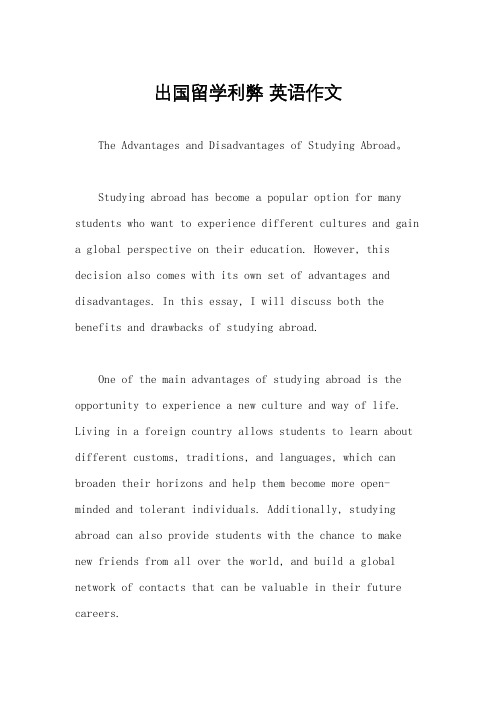
出国留学利弊英语作文The Advantages and Disadvantages of Studying Abroad。
Studying abroad has become a popular option for many students who want to experience different cultures and gain a global perspective on their education. However, this decision also comes with its own set of advantages and disadvantages. In this essay, I will discuss both the benefits and drawbacks of studying abroad.One of the main advantages of studying abroad is the opportunity to experience a new culture and way of life. Living in a foreign country allows students to learn about different customs, traditions, and languages, which can broaden their horizons and help them become more open-minded and tolerant individuals. Additionally, studying abroad can also provide students with the chance to make new friends from all over the world, and build a global network of contacts that can be valuable in their future careers.Another benefit of studying abroad is the opportunity to receive a high-quality education from a prestigious international institution. Many countries, such as the United States, the United Kingdom, and Australia, are known for their top-ranked universities and colleges, which offer a wide range of academic programs and cutting-edge research facilities. By studying at one of these institutions, students can gain access to world-class education and enhance their academic credentials, which can give them a competitive edge in the job market.However, studying abroad also has its drawbacks. One of the main disadvantages is the high cost of tuition, living expenses, and travel. International students often have to pay higher fees than local students, and they may also face additional expenses such as visa fees, health insurance, and transportation costs. As a result, many students may struggle to afford the financial burden of studying abroad, and they may have to rely on scholarships, loans, or part-time work to make ends meet.Another disadvantage of studying abroad is the challenge of adapting to a new environment and dealing with homesickness. Living in a foreign country can be a daunting experience, especially for students who are away from their family and friends for the first time. They may feel isolated, lonely, and homesick, and they may struggle to adjust to the cultural differences and language barriers. This can lead to feelings of anxiety, depression, and stress, which can have a negative impact on their academic performance and mental well-being.In conclusion, studying abroad offers many benefits, such as exposure to new cultures, a high-quality education, and the opportunity to make international connections. However, it also comes with its own set of challenges, including the high cost of living and the difficulty of adjusting to a new environment. Therefore, students should carefully weigh the advantages and disadvantages of studying abroad before making a decision, and they should be prepared to face the potential hardships that may arise during their time overseas.。
出国留学的优点和缺点英语作文
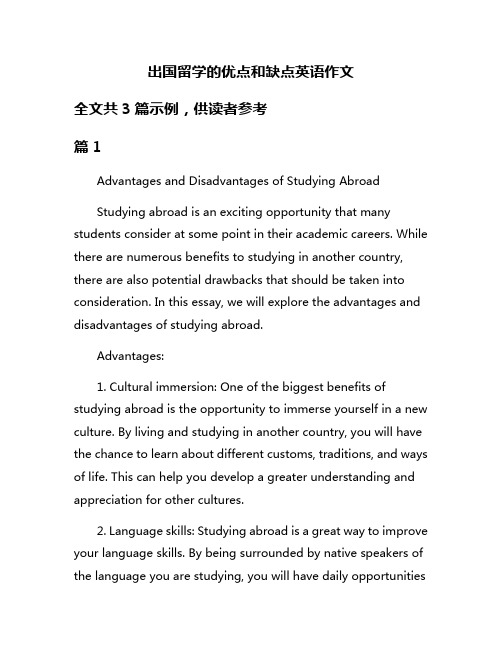
出国留学的优点和缺点英语作文全文共3篇示例,供读者参考篇1Advantages and Disadvantages of Studying AbroadStudying abroad is an exciting opportunity that many students consider at some point in their academic careers. While there are numerous benefits to studying in another country, there are also potential drawbacks that should be taken into consideration. In this essay, we will explore the advantages and disadvantages of studying abroad.Advantages:1. Cultural immersion: One of the biggest benefits of studying abroad is the opportunity to immerse yourself in a new culture. By living and studying in another country, you will have the chance to learn about different customs, traditions, and ways of life. This can help you develop a greater understanding and appreciation for other cultures.2. Language skills: Studying abroad is a great way to improve your language skills. By being surrounded by native speakers of the language you are studying, you will have daily opportunitiesto practice and improve your language skills. This can be particularly helpful for students studying languages such as Spanish, French, or Mandarin.3. Personal growth: Studying abroad can be a transformative experience that helps you grow personally and academically. By stepping outside of your comfort zone and navigating a new environment, you will develop important skills such as independence, adaptability, and resilience.4. Career opportunities: Studying abroad can also boost your career prospects. Employers often value candidates who have international experience, as it demonstrates that you areopen-minded, resourceful, and able to work effectively in diverse environments. Studying abroad can also help you build a global network of contacts that can be beneficial for your future career.5. Travel opportunities: Studying abroad provides you with the chance to travel and explore new places. Whether it's weekend trips to nearby cities, or longer excursions during school breaks, studying abroad offers a unique opportunity to see the world and expand your horizons.Disadvantages:1. Cost: One of the biggest drawbacks of studying abroad is the cost. Tuition fees, accommodation, food, transportation, and other expenses can add up quickly, making studying abroad a significant financial investment. Additionally, currency exchange rates and fluctuating living costs can make it difficult to budget effectively.2. Homesickness: Being away from home and loved ones can be challenging, particularly if you are studying in a country with a different culture and language. Feelings of homesickness can be difficult to cope with, and may impact your academic performance and overall well-being.3. Language barrier: While studying abroad can help you improve your language skills, it can also pose a challenge if you are not fluent in the language spoken in the host country. Communication difficulties can make it harder to form relationships, navigate everyday tasks, and succeed academically.4. Cultural differences: Adjusting to a new culture can be a difficult and sometimes frustrating process. Different customs, values, and social norms may be unfamiliar or even contradictory to what you are used to, which can lead to misunderstandings and cultural clashes.5. Academic challenges: Studying in a foreign educational system can present academic challenges, such as different teaching styles, grading systems, and course requirements. Adapting to these differences can be time-consuming and stressful, and may require additional support and resources.In conclusion, studying abroad offers a wealth of benefits, from cultural immersion and language skills to personal growth and career opportunities. However, it also comes with potential drawbacks, such as cost, homesickness, language barriers, cultural differences, and academic challenges. Before deciding to study abroad, it is important to carefully consider these factors and weigh the pros and cons to determine if studying abroad is the right choice for you.篇2Advantages and Disadvantages of Studying AbroadIn recent years, studying abroad has become an increasingly popular option for students looking to further their education. While there are many advantages to studying in a foreign country, there are also some drawbacks that should be considered. In this essay, we will explore the advantages and disadvantages of studying abroad.One of the main advantages of studying abroad is the opportunity to immerse yourself in a new culture. By living and studying in a foreign country, you can gain a deeper understanding of the local customs, traditions, and way of life. This can help you develop a more global perspective and improve your cross-cultural communication skills. Additionally, studying abroad can open up new opportunities for personal and professional growth, as you may be exposed to different ways of thinking and new experiences that can help you broaden your horizons.Another advantage of studying abroad is the chance to learn a new language. Many students choose to study in a country where the language spoken is different from their own, which can provide a valuable opportunity to become fluent in a second language. This can be a valuable skill in today's globalized world, as being bilingual or multilingual can give you a competitive edge in the job market and open up new career opportunities.Furthermore, studying abroad can also help you develop important life skills such as independence, adaptability, and resilience. Living in a foreign country can be challenging at times, as you may face language barriers, cultural differences, and homesickness. However, overcoming these challenges can helpyou become more self-reliant and confident in your abilities to handle new situations. Studying abroad can also help you build a network of international contacts, which can be beneficial for your future career prospects.Despite the many advantages of studying abroad, there are also some disadvantages that should be considered. One of the main drawbacks is the cost of studying in a foreign country. Tuition fees, living expenses, travel costs, and other expenses can add up quickly, making studying abroad a costly undertaking. Additionally, some students may struggle with feelings of homesickness or loneliness while living in a foreign country, particularly if they are far away from their family and friends.Another disadvantage of studying abroad is the potential for academic challenges. The education system in a foreign country may be different from what you are used to, which can make it difficult to adjust to a new learning environment. Additionally, language barriers or cultural differences may make it harder for you to succeed academically, especially if you are not fluent in the local language. It may also be challenging to navigate the administrative processes and requirements of studying in a foreign country, which can be time-consuming and stressful.In conclusion, studying abroad can offer many benefits, such as cultural immersion, language learning, and personal growth. However, it is important to be aware of the potential drawbacks, such as the high cost, academic challenges, and homesickness. Before deciding to study abroad, it is important to weigh the pros and cons carefully and consider how the experience will fit into your overall academic and career goals. Ultimately, studying abroad can be a valuable and rewarding experience, but it is important to be prepared for the challenges that may arise.篇3Advantages and Disadvantages of Studying AbroadStudying abroad has become increasingly popular among students in recent years. There are many benefits to studying in a foreign country, such as gaining a global perspective, experiencing a new culture, and improving language skills. However, there are also challenges and drawbacks that come with studying abroad. In this essay, we will explore the advantages and disadvantages of studying abroad.Advantages:1. Global perspective: Studying abroad allows students to gain a broader understanding of the world and different cultures.By living in a foreign country, students are exposed to new ideas, beliefs, and customs, which can help them develop a more open-minded and global perspective.2. Language skills: One of the biggest advantages of studying abroad is the opportunity to improve language skills. Immersing oneself in a foreign language environment can greatly enhance language proficiency and fluency, making it easier to communicate with people from different backgrounds.3. Personal growth: Studying abroad challenges students to step out of their comfort zones and adapt to new environments. This can help students develop independence, resilience, and self-confidence, as they navigate unfamiliar territories and overcome obstacles on their own.4. Career opportunities: Studying abroad can enhance a student's resume and attract employers who value international experience. Global experience is becoming increasingly important in today's interconnected world, and studying abroad can provide students with a competitive edge in the job market.5. Cultural experiences: Studying abroad allows students to immerse themselves in a different culture, from trying new foods to participating in local festivals and traditions. This can be aenriching and eye-opening experience that broadens one's understanding of the world.Disadvantages:1. Homesickness: Being away from home for an extended period of time can be challenging, and many students experience feelings of homesickness when studying abroad. Missing family and friends, as well as familiar surroundings, can make it difficult to adjust to life in a foreign country.2. Language barrier: While studying abroad can improve language skills, it can also be a barrier to communication and understanding. Students may struggle to express themselves or understand others, especially in academic settings where specialized vocabulary is used.3. Cultural differences: Adjusting to a new culture can be overwhelming, with unfamiliar social norms, customs, and expectations. Students may experience culture shock and find it difficult to navigate social interactions or daily life in a foreign country.4. Financial challenges: Studying abroad can be expensive, with tuition fees, living expenses, travel costs, and other expenses adding up quickly. This can put a strain on students'finances and make it difficult to afford basic necessities or extracurricular activities.5. Academic differences: Studying abroad may require students to adjust to a different academic system, with different teaching styles, assessment methods, and expectations. This can be challenging for students who are used to a specific way of learning and may struggle to adapt to new requirements.In conclusion, studying abroad offers many advantages, from gaining a global perspective to improving language skills and expanding cultural experiences. However, it also comes with challenges and drawbacks, such as homesickness, language barriers, cultural differences, financial challenges, and academic differences. It is important for students to weigh the pros and cons of studying abroad carefully and prepare themselves for the opportunities and challenges that lie ahead. Ultimately, studying abroad can be a transformative and rewarding experience that broadens horizons and opens doors to new possibilities. (Word count: 478)。
海外留学利弊英语作文

海外留学利弊英语作文The Advantages and Disadvantages of Studying Abroad。
Studying abroad has become a popular trend in recent years. Many students choose to go to foreign countries for their higher education, seeking new experiences and opportunities. However, studying abroad also comes with its own set of advantages and disadvantages.One of the biggest advantages of studying abroad is the opportunity to experience a new culture. Living in a foreign country allows students to immerse themselves in a different way of life, learn a new language, and gain a better understanding of the world. This can be a valuable experience that helps students develop a broader perspective and become more open-minded.Another advantage of studying abroad is the opportunity to receive a high-quality education. Many countries, especially those in Europe and North America, are home tosome of the world's top universities. Studying at one of these institutions can provide students with access to top-notch professors, cutting-edge research facilities, and a diverse and challenging academic environment.Additionally, studying abroad can also provide students with valuable career opportunities. Many employers valuethe international experience and cultural awareness that comes with studying abroad. This can give students a competitive edge in the job market and open up new career opportunities in their home country or abroad.Despite its many advantages, studying abroad also hasits downsides. One of the biggest disadvantages is the high cost. Tuition fees and living expenses in foreign countries can be significantly higher than in the student's home country. This can make studying abroad unaffordable for many students, especially those from low-income backgrounds.Another disadvantage of studying abroad is thepotential for homesickness and culture shock. Living in a foreign country can be challenging, especially for studentswho are not used to being away from their families and friends. Adapting to a new culture, language, and way of life can be difficult and stressful, and some students may struggle to adjust.Furthermore, studying abroad can also presentlogistical challenges, such as obtaining visas, finding accommodation, and navigating a new healthcare system. These practical issues can be time-consuming and overwhelming, especially for students who are not familiar with the local laws and customs.In conclusion, studying abroad offers many advantages, such as the opportunity to experience a new culture, receive a high-quality education, and gain valuable career opportunities. However, it also comes with its own set of challenges, including high costs, homesickness, and logistical issues. Ultimately, the decision to study abroad should be carefully considered, weighing the potential benefits and drawbacks before making a commitment to this life-changing experience.。
雅思范文:留学的利弊(中英对照)

雅思范文:留学的利弊(中英对照)题目:Going overseas for university study is an exciting prospect for manypeople. But while it may offer some advantages, it is probably better to stayhome because of the difficulties a student inevitably encounters living andstudying in a different culture.To what extent do you agree or disagree with this statement?对许多人来说,去海外读大学是一个令人兴奋的前景。
但是,虽然它可能提供一些优势,但由于学生在不同的文化中生活和学习不可避免地会遇到困难,所以留在家里可能更好。
你在多大程度上同意或不同意这种说法?范文:There is no doubt that going to study in a foreign country, with itsdifferent language and culture, can be a frustrating and sometimes painfulexperience. But while overseas study has its drawbacks, the difficulties are faroutweighed by the advantages. Indeed, people who go abroad for study openthemselves up to experiences that those who stay at home will never have.The most obvious advantage to overseas university study is real-life use ofa different language. While a person can study a foreign language in his or herown country, it cannot compare with constant use of the language in academic andeveryday life. There is no better opportunity toimprove second-language skillsthan living in the country in which it is spoken. Moreover, having used thelanguage during one's studies offers a distinct advantage when one is applyingfor jobs back home that require the language.On a university campus, the foreign student is not alone in having comefrom far away. He or she will likely encounter many others from overseas and itis possible to make friends from all around the world. This is not only excitingon a social level, but could lead to important overseas contacts in laterprofessional life.Finally, living and studying abroad offers one a new and differentperspective of the world and, perhaps most important, of one's own country. Oncebeyond the initial shock of being in a new culture, the student slowly begins toget a meaningful understanding of the host society. On returning home, oneinevitably sees one's own country in a new, often more appreciative, light.In conclusion, while any anxiety about going overseas for university studyis certainly understandable, it is important to remember that the benefitsoffered by the experience make it well worthwhile.译文:毫无疑问,去一个语言和文化都不同的国家学习,可能是一个令人沮丧的、有时是痛苦的经历。
- 1、下载文档前请自行甄别文档内容的完整性,平台不提供额外的编辑、内容补充、找答案等附加服务。
- 2、"仅部分预览"的文档,不可在线预览部分如存在完整性等问题,可反馈申请退款(可完整预览的文档不适用该条件!)。
- 3、如文档侵犯您的权益,请联系客服反馈,我们会尽快为您处理(人工客服工作时间:9:00-18:30)。
雅思写作Task2范文:去国外留学的利弊去国外留学有利有弊,你怎么看呢?如果让你据此写一篇观点文章,该如何写?请看本文。
认真研读一定的雅思范文及作文模板可以帮助我们检验自己的写作水平,并能很好地吸收和应用优秀范文里的优秀内容。
Going overseas for university study is an exciting prospect for many people. But while it may offer some advantages, it is probably better to stay home because of the difficulties a student inevitably encounters living and studying in a different culture.
To what extent do you agree or disagree with this statement?
Model Answer:
There is no doubt that going to study in a foreign country, with its different language and culture, can be a frustrating and sometimes painful experience. But while overseas study has its drawbacks, the difficulties are far outweighed by the advantages. Indeed, people who go abroad for study open themselves up to experiences that those who stay at home will never have.
The most obvious advantage to overseas university study is real-life use of a different language. While a person can study a foreign language in his or her own country, it cannot compare with constant use of the language in academic and everyday life. There is no better opportunity to improve second-language skills than living in the country in which it is spoken. Moreover, having used the language during one's studies offers a distinct advantage when one is applying for jobs back home that require the language.
On a university campus, the foreign student is not alone in having come from far away. He or she will likely encounter many others from overseas and it is possible to make friends from all around the world. This is not only exciting on a social level, but could lead to important overseas contacts in later professional life.
Finally, living and studying abroad offers one a new and different perspective of the world and, perhaps most important, of one's own country. Once beyond the initial shock of being in a new culture, the student slowly begins to get a meaningful understanding of the host society. On returning home, one inevitably sees one's own country in a new, often more appreciative, light.
In conclusion, while any anxiety about going overseas for university study is certainly understandable, it is important to remember that the benefits offered by the experience make it well worthwhile.。
